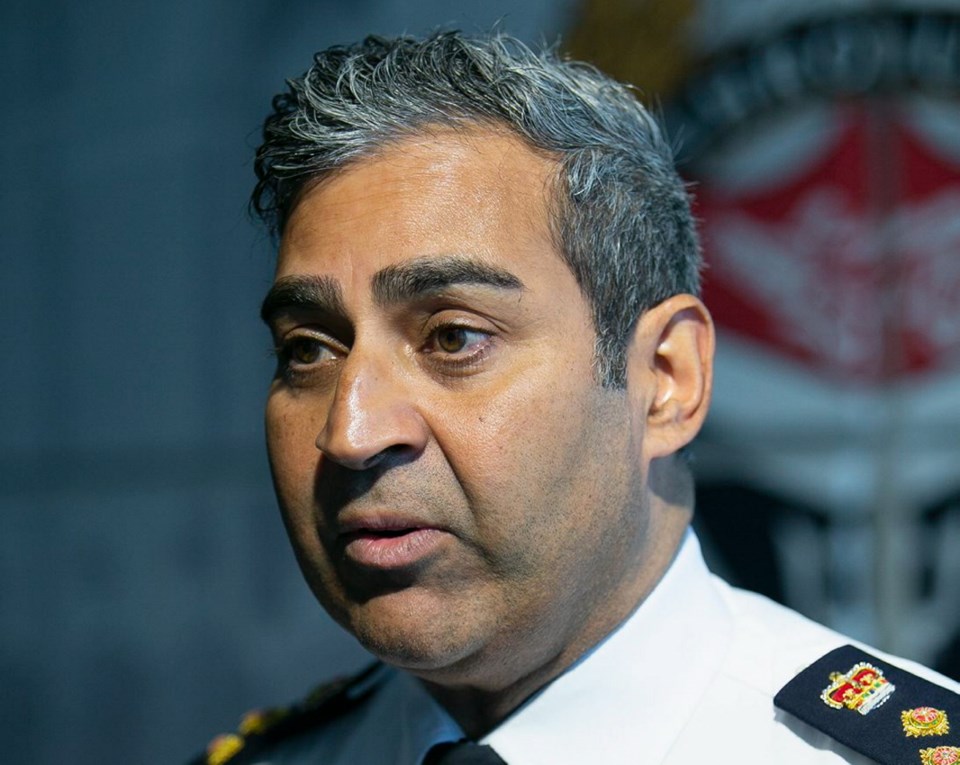Victoria Police Chief Del Manak is considering hiring unarmed special constables to ease the workload for sworn officers as his department struggles to cope with staff shortages and budget pressures.
The proposal is one of several strategies contained in a department “transformation” report set for release Wednesday, Manak confirmed in an interview.
“We’re actually looking at special municipal constables,” he said. “So do we need a police officer to attend every call? Is there a hybrid?
“It’s almost like two-tier policing. Can we have somebody who has a higher level of training, but they’re not a sworn police officer and they don’t carry a firearm, but they can assist police officers in completing administrative tasks.”
Manak noted that the Vancouver and Abbotsford police departments already have similar programs, where special municipal constables perform low-risk tasks such as picking up statements, transporting and tagging property, and securing the perimeter at police incidents.
“It has been introduced in B.C. in small areas and we think that there’ll be a benefit to our organization,” he said.
Sean Plater, president of the Victoria City Police Union, confirmed that the union has been in discussions with the department about the special constables and their possible duties, but he offered no additional comment.
Tom Stamatakis, president of the B.C. Police Association, said police unions generally are open to looking at service-delivery models that make sense. But he said it’s important that police departments carefully evaluate the duties assigned to special municipal constables.
“If you’re not careful about it, and you’re not thoughtful about the duties that you’re going to try to assign to a special municipal constable, it could end up being less efficient and more costly,” he said, noting that a special constable could respond to a scene and realize they have to call in a sworn officer anyway.
Stamatakis said there are other implications as well.
“It costs money to recruit people. It costs money to train people. Those are finite resources, too.
“So if you’re now having to constantly recruit and train [special municipal constables], does that take away from your capacity to be able to provide necessary training to police officers?”
Manak said the department hopes to launch the program as a pilot project as it tries to find more efficient ways of delivering service.
He said the department is short more than 40 officers due to a variety of reasons, including physical and stress-related injuries.
“I have 208 police officers that are trying to do the work of 249 officers,” he said. “It’s not going well. The officers are under a tremendous amount of stress and pressure.”
Besides hiring special constables, Manak said he’s considering a number of other steps, including managing the department’s call load.
“Does the Victoria Police Department have to attend all the calls that come into us?” he said. “Can we defer some to bylaw [officers]? Can we say that we’re not going to attend certain lower [priority] calls?”
Last month, Manak disbanded a nine-member crime-reduction unit so that his department could better respond to 911 calls.
The move followed a decision to eliminate front-desk service hours on evenings and weekends.
Victoria council approved in March a 3.2 per cent increase to a nearly $54-million annual police budget, but rejected Manak’s request for more officers and forced the department to absorb the $690,000 cost of B.C.’s new employer health tax — something other city departments were not required to do.


